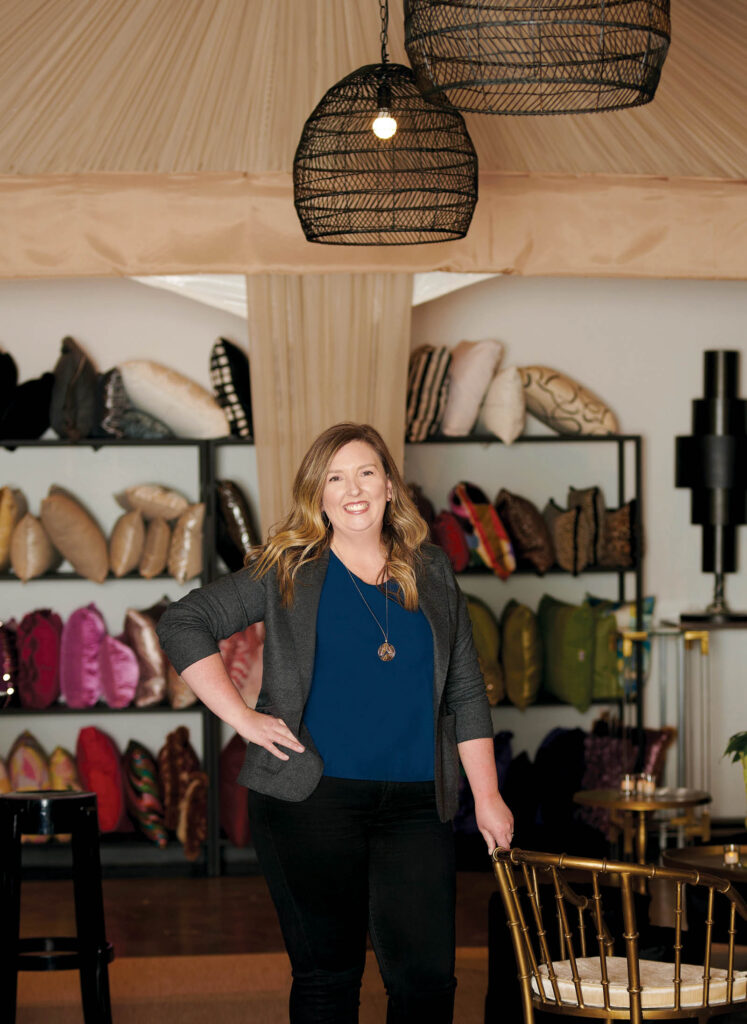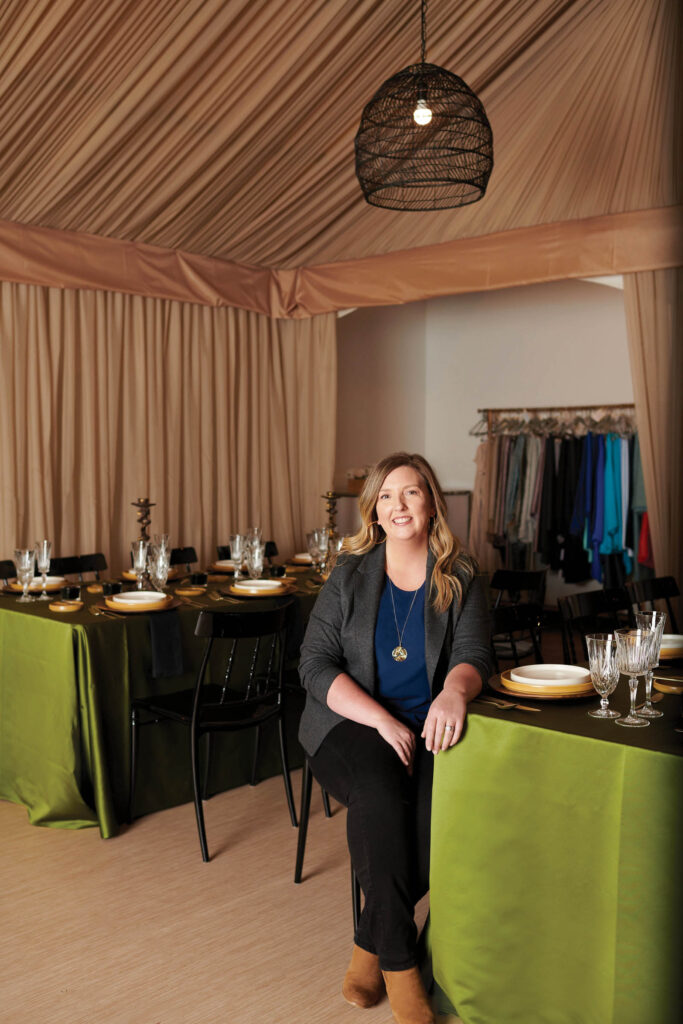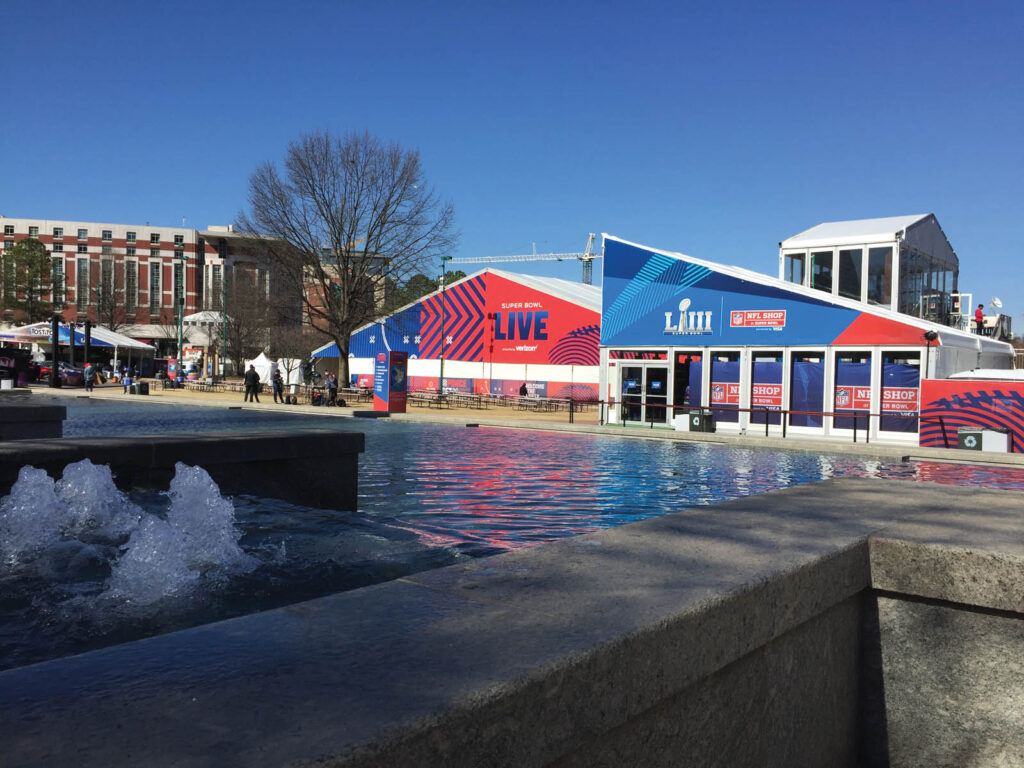
Canadian sales executive Michelle McCulloch knew from age 12 she wanted to become a mover and shaker in the tent rental industry.
Growing up in the Ontario-based family business Regal Tents & Structures, the now-40-year-old sales executive was able to learn the tricks of the trade thanks to strong mentorship from her parents. While she answered phones and otherwise worked behind the scenes, her bookkeeper mom showed her the financial end and her salesman dad taught her the importance of establishing relationships.
“I remember being a kid and sitting around the dinner table talking about the incredible events we were going to be a part of,” she notes. “Once we did a brand launch in Central Park, and another time we put a tent on the White House front lawn. It just sounded so exciting to me, and I knew I wanted to be a part of it.”
After graduating from college with a business degree, McCulloch joined the sales team at Regal, which at that time rented tents for some 100 events each year. Her first major project as a 22-year-old newbie? Bidding out a multimillion-dollar tent rental for an 1,800-person University of Pennsylvania gala fundraiser, and then presenting the 3D CAD drawings and proposal to a committee. The required tenting amounted to 100,000 square feet.
“It was the most nerve-racking thing I’ve ever done in my life,” she remembers. “I remember getting the call from the client telling us we won the job, and I think I screamed. I did not keep my cool at all.”
After Regal was sold to Chair-man Mills Corp. in 2021, McCulloch rose to an executive role as vice president of sales and operations. Her mom has since retired, while her dad consults for the company.
Nowadays, McCulloch’s role is seldom confined to a 9 to 5 schedule. Not only are all the company divisions still adjusting to the logistical changes of the merger, but demand has been extreme due to the rescheduling of multiple events postponed by the COVID pandemic.
“We’ve just been doing everything we can to serve clients,” she notes. “We’ve had to say no to a lot of clients [in 2022], partly because of inventory and labor shortages. So now we’re focusing on being able to handle more work [in 2023].”

Life on the go: Overseeing a coast-to-coast business
These days, when not splitting her time between Chair-man divisions in Hamilton and Toronto, McCulloch is often traveling the continent quoting jobs, planning logistics and overseeing installations. Specialty Fabrics Review chatted with the vice president between sessions she was attending at the November 2022 Manufacturers and Tent Renters Association conference in South Carolina.
“I’m still very involved in day-to-day issues as they arise—managing inventory and people shortages, delineating strategy for next year and communicating with the team and making them happy,” she explains.
Though Regal could technically install tents across the globe—and has completed work as far away as Turks and Caicos in the Caribbean—the majority of its work takes place in greater Toronto. “The job does have to be of a certain size to make sense, if we are traveling outside our core market,” she adds.
Because Regal is known for its ability to aptly handle large and challenging projects, many of its installations have been very high profile. For example, the firm was hired to install multiple tents for the Super Bowl LIII Live Experience in 2019, a task that involved custom branding for multiple sponsors. McCulloch calls the outcome “an incredible feat.”
One event that stands out for McCulloch was the $2,500-to-$10,000/plate fundraiser held by Madonna and fashion brand Gucci on the lawn of the United Nations, to benefit her charitable organization Raising Malawi.
Due to temperature variations, Regal had to transport vinyl for the fundraiser in climate-controlled trucks, using electric blankets and heat blowers to prevent cracking and shattering. A custom-engineered floor was also designed to weigh down the structures.
Other Regal tents have helped further important work, such as those installed over archaeological dig sites in Canada to help prevent the ground from freezing and protect workers from the elements.
Bouncing back from COVID
Like many tent rental companies worldwide, Regal was hit hard by COVID-19. When event rental orders across North America dropped dramatically in March 2020, it had to pivot and try to recoup revenues by renting tents that enabled vaccinations and public health checks.
Now it’s in the process of rebuilding its U.S. business, which came to a screeching halt when borders were closed due to the pandemic. That segment of the business has traditionally centered around the West Coast and Washington, D.C.
This year, it was able to complete several U.S. installations, and revenues rose back to pre-COVID levels.
“We have a social media marketing strategy and do a lot of that,” McCulloch notes. “But luckily, we’ve had a lot of growth just from answering our phones.”
Regal reputation: Team effort leads to success
McCulloch gives much of the credit for Regal’s success to its team of employees, which temporarily expands from 45 to about 100 people during the May-through-October busy season. Some loyal workers have been with Regal for longer than 30 years, a happy situation she attributes to luck, investments in employee training and a family-like company culture.
“We have this incredible team of experts, from sales managers to operations managers to crew leaders and their crews,” she says. “We’re committed to partnering in every event and doing everything we can to make events successful. My dad used to say that the best customers are ones who had used other tent companies before, and had one or two bad experiences, so they can come experience our commitment and expertise.”
That’s not to say maintaining those standards is always easy.
“I think the greatest challenge is the seasonality of it,” she says. “We make 80% of our revenue in six months of the year. It can also be difficult to retain incredible talent and to bring in new inventory products when the market is seasonal.”
For better or worse, the off-season is almost equally busy for McCulloch, who spends that time developing her teams, buying new inventory, evaluating issues from the previous season and forming new strategies for spring.
“Maybe this sounds a little kitschy, but you’ve got to come to work and have fun and enjoy the people you work with,” she says of her managerial philosophy. “If it’s not fun, you shouldn’t be doing it. And investing in your team and your people is the most important thing.”
Michelle Miron is a freelance writer based in Hugo, Minn.
SIDEBAR: Q&A
To what extent is Chair-man Mills Corp. still dealing with supply chain issues, and what are some ways it’s combating those issues?
We’re planning as far in advance as possible. What used to take eight weeks to ship now takes 16. By anticipating trends a year ahead and placing orders early, we’re able to invest in new inventory and meet demand.
You mention being a parent and placing a high priority on work-life balance. What are some ways you make that work when you’re in such a demanding role?
The new work environment has flexibility in the office and options to work from home, which has seriously helped my work-life balance. I work in the office to achieve collaboration with my team, and I make sure to work from home with intention.
SIDEBAR: Project Snapshot

A ‘Super’ installation
“More than 40 of our tents were set up for the Super Bowl LIII Live Experience at the Centennial Olympic Park in Atlanta, Ga.,” says McCulloch. “They housed a stage, bars, food and beverage areas and spaces for VIP, entry, medical, sponsorship, merchandise and security functions.
“We used two 50-meter clearspan tents, 15 Legacy tents, two Q-Series tents, one double-decker tent and 20 frame tents, many with custom branding decals and glass doors. Flooring solutions included Supa-Trac™ floors and cassette floors with artificial AstroTurf® on top.
“All the tents we installed were full of variety and colors that gave off a strong visual identity.”
 TEXTILES.ORG
TEXTILES.ORG


